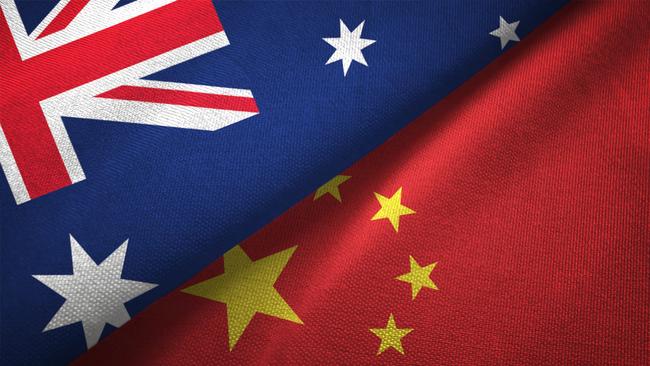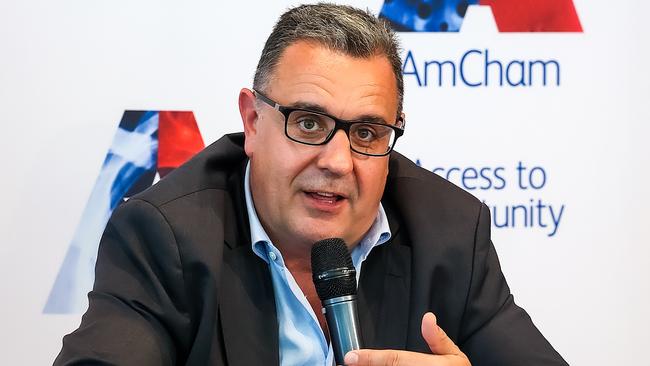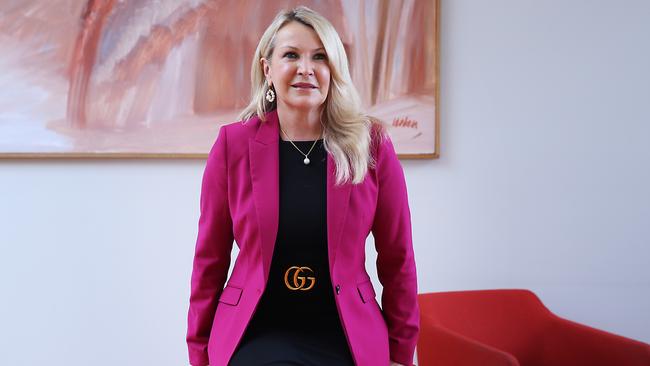Australian companies ‘still keen to work with China’: report
Australian companies are still keen to do business with China despite increasing political tensions, according to a report by the Australia China Relations Institute.

Australian companies are still keen to do business with China despite increasing political tensions, according to a report by the Australia China Relations Institute at Sydney’s UTS.
The report shows companies, including Fortescue Metals Group, Woodside, Blackmores, Treasury Wine Estates, Costa Food, Lendlease, Bubs and Elders continue to see strong opportunities in the China market.
Treasury Wine Estates chief executive Tim Ford says TWE is still determined to export its Penfolds brand into China, despite the heavy tariffs on Australian wine going into China.
But he says this will be done through Penfolds wine produced in the US and France.
The tariffs were imposed in November last year and confirmed by Chinese authorities in April this year to last another five years.
“When the tariffs [on Australian wine] happened, everyone said you have to take China off your game plan,” TWE chief executive Tim Ford said in the report.
“But I was like ‘No, it stays on there’. We remain committed to China. We are just going to work out a different way to achieve it.”
“We continue to have strong engagement with China.”
TWE is now exporting Penfolds wine produced in the US to China with plans to export Penfolds from France set to go into place at the end of 2022.
It is also selling its popular cheaper end Rawson’s Retreat brand made in South Africa to China.
“We see China as an enduring partner for our LNG business and also for future development of clean energy and other low carbon offerings such as hydrogen,” Woodside’s head of China operations, Kristine Leo said.
“We continue to see very strong interest in our product from Chinese buyers. We already have long-term customers in China and we continue to engage with a number of others about short and midterm deals.”
“Woodside regards the energy market in China as strong and progressive. Our strategy includes China in the long term as both customer and partner.”
She said Woodside also saw its China business being part of its work to reduce its emission targets.
“China’s focus on innovation and emissions targets aligns well with Woodside’s climate ambitions and priorities,” she said.

Fortescue Metals Group chief executive Elizabeth Gaines said the growth of Fortescue was “intrinsically linked to meeting the iron ore supply gap in China.”
“Chinese customers remain our key market, accounting for almost 90 per cent of our revenue,” she said.
Gaines said FMG’s continued operations in China would include its move into green energy technologies including through its new subsidiary, Fortescue Future Industries (FFI).
“We will develop projects and technologies with a focus on reducing emissions from iron and steel making and work with current and prospective customers in China on the application of the technology and supply of green hydrogen and ammonia from FFI.”
“The Chinese market is simply too big to ignore,” the executive chair of infant formula company Bubs, Dennis Lin said.
“In China there are more than 12 million babies born a year. If you assume that babies use infant formula for three years, that’s an addressable market of more than 36 million.”
“We have to find a way to continue to do business there. Even though we are at trough in Australia China relations, at Bubs we are proving we can survive and prosper.”
Lin said Bubs has spent the past two years reworking its supply chain into China which was hit by the loss of the Chinese students and tourists, or daigou, buying its products to sell to friends and family back home.
He said the strategy, which involved working through more sophisticated middle operators with online platforms which can be used by daigou buyers in both Australia and China is now paying dividends.
“With each challenge we have built up our proprietary intelligence about doing business in China which makes it harder for our competitors.”
But he said Bubs was not putting all its export eggs in the China market with plans to step up its sales into the US market.
Costa Group chief executive Sean Hallahan said the company was planning to expand its blueberry farming operation in China’s Yunnan province, a business which currently generates some $60 million a year.
The company has plans to double its current 250 hectares of land under cultivation in the province to around 500 hectares over the next few years.
Hallahan said Costa was increasing its exports of Australian citrus to China with the acquisition of central Queensland based mandarin grower, 2PH Farmers earlier this year.
But he said that Costa would look to limit its total export market to China to 10 per cent of the total.
“We think 10 per cent is about right from an export point of view. We aren’t over exposed to China. That’s been a conscious choice.”
He said that Australian companies were still able to do business in China despite increasing political tensions.
“There can be a lot of hyperbole about what’s going on politically, but it’s good to have solid business relationships that show that there is a way of doing things that can continue to happen in the background.
“I don’t think anyone wants Australia and China to stay in a state of argument. We would prefer to get along, wouldn’t we?”
Lendlease Asia chief executive, Justin Gabbani, said the company saw China as an “ideal market” for the company to export its expertise in the retirement village sector.
The company has just opened its first retirement village in China, on the outskirts of Shanghai, called Ardor Gardens.

He said the Chinese Government’s long term plan for the housing of China’s ageing population, which includes having seven per cent of older Chinese living in retirement village style accommodation, was a factor in Lendlease’s confidence in investing in the sector.
“The senior living sector receives strong support from the government with favourable policies toward the retirement and community care sector,” he said.
Mr Gabbani said Lendlease, which has been operating in China for the past 30 years, where it has completed more than 350 projects, continues to see the country as place to do business.
“China’s huge domestic market remains a strong focus for global businesses such as Lendlease,” he said.
“While there are geopolitical tensions that take place throughout the world at any given time, it should not detract us from focusing on the value we contribute through the markets we operate (in).”
Danny Armstrong, the chief executive of accounting and advisory firm SW Australia, said there was still interest by Australian companies in expanding into China.
“China is the biggest growth economy in the world. Australia and China have highly complementary economies. The people on the ground tell us there is still strong demand for Australian products.”
“We might have a bit of a bumpy period to navigate, but we think the opportunity in the long run is still strong.”
Mr Armstrong said SW was currently advising some Australian companies in the fitness area about expanding into China.
“In my experience business wants to get on with business and given a reasonable playing field, business will get on with business regardless of the politics.”
The companies were keen to see an improvement in the political relationship between Australia and China.
“There is a lot in common between the Chinese people and Australians,” the global chief executive of law firm King & Wood Mallesons, Hong Kong based Sue Kench said.
“I would like to see the relationship improve. There are opportunities from an engagement perspective as well.”
Kench said that while there were tensions between the US and China, US companies were continuing to do business there.
“It is naive to think that others will give up that opportunity (of the China market).”
“The US is not giving up that opportunity.”
“There is connectivity across multiple sectors between the US and China to the extent of trillions of dollars. Decoupling is not going to happen.”
The Federal Government’s export promotion agency Austrade is also still positive about the potential of the China market despite political tensions and China’s actions against Australian wine, coal, timber and beef.
Austrade’s Beijing based general manager for China, Daniel Boyer, said he was “pretty positive about the Australia China commercial relationship in the longer term.”
“Clearly times are tough at the moment, especially in some trade exposed sectors. But China is and will remain an important economic partner for Australia.”
“Business is still being done and Austrade is actively supporting exporters and their partners to continue to trade.”
“At some stage, the current challenges will reach a new settling point. It may not be an entirely positive settling point, but at least it will be stable. At that point, the underlying strength of the commercial relationships that have been built between our two countries over decades will again realise their potential.”
“The potential rewards of doing business in China are very much worth it, if you’re in the right sector and have the right strategy. The size of the middle class, the demand for quality products and services, the sophisticated digital landscape and the sheer scale of opportunity here all play to Australia’s strengths.”






To join the conversation, please log in. Don't have an account? Register
Join the conversation, you are commenting as Logout